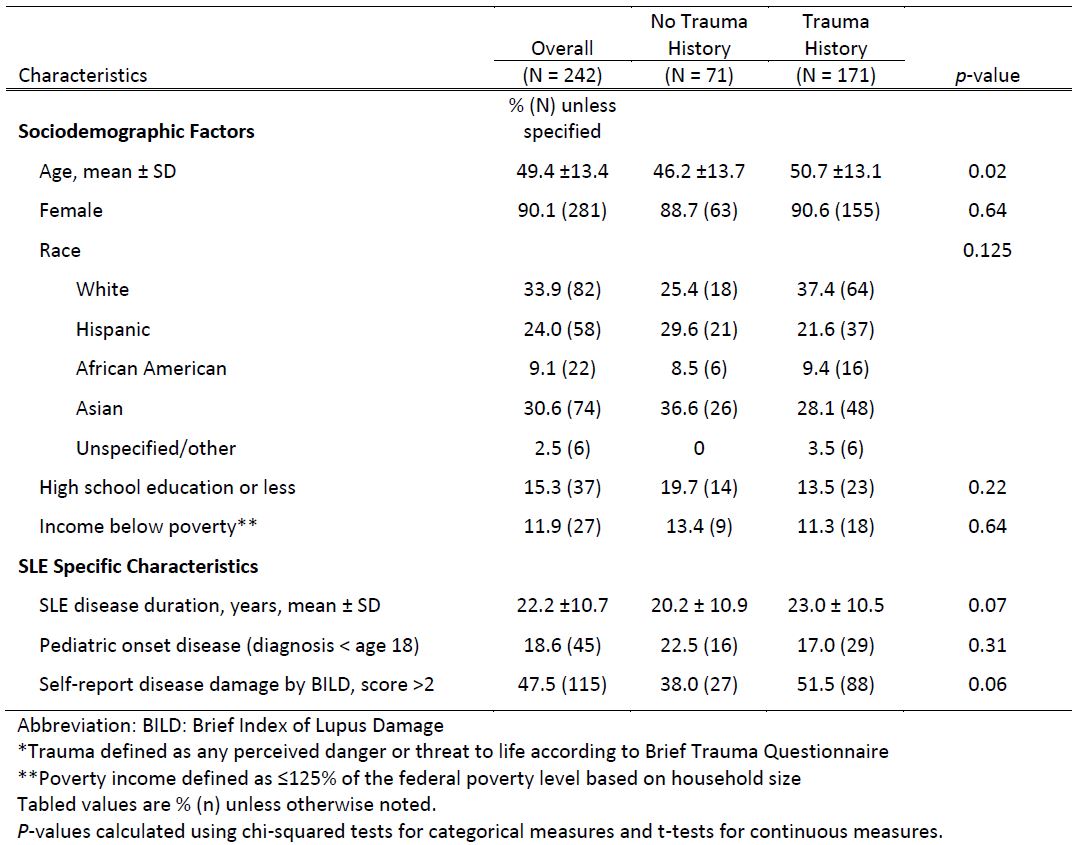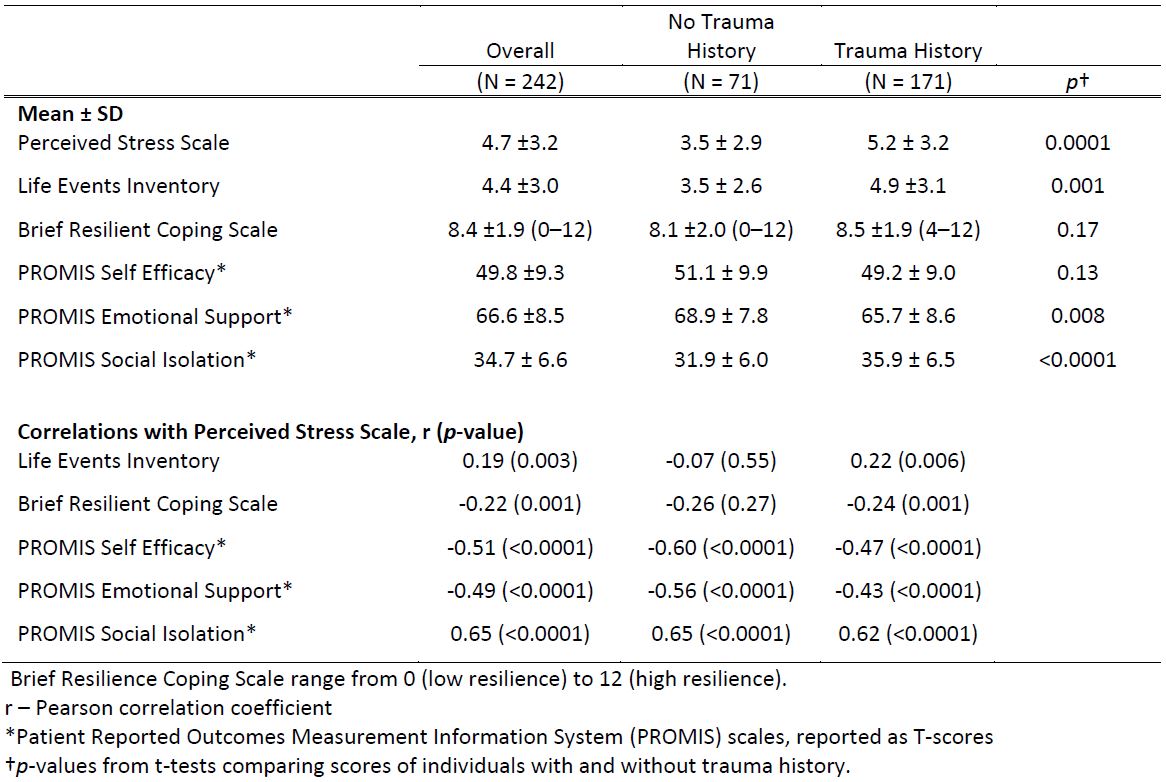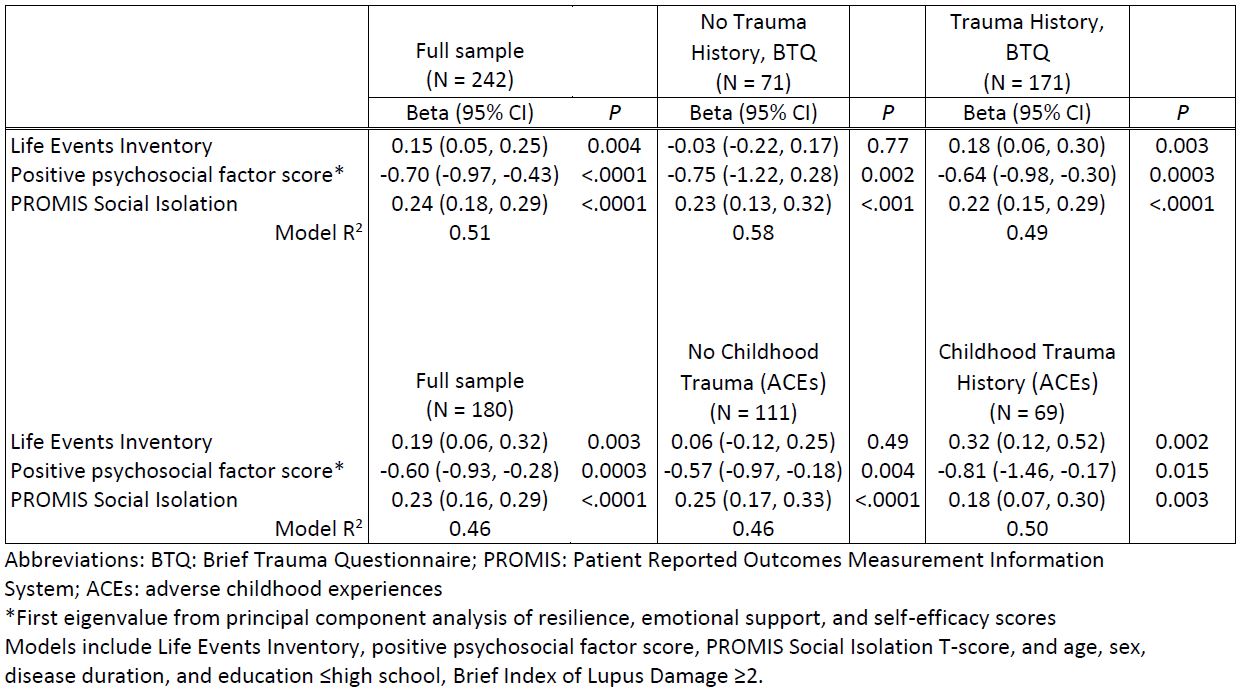Session Information
Date: Tuesday, November 14, 2023
Title: (2019–2038) Patient Outcomes, Preferences, & Attitudes Poster III
Session Type: Poster Session C
Session Time: 9:00AM-11:00AM
Background/Purpose: Trauma exposures are associated with SLE onset and disease activity; perceived stress is also associated with greater SLE disease activity and worse patient-reported outcomes. However, perceptions of stress vary in response to life events and may be influenced positively and negatively by psychosocial factors. In an SLE cohort, we examined the association of stressful events with perceived stress, whether psychosocial factors affected perceived stress, and whether these relationships varied by prior trauma exposures.
Methods: Data were from a sample of adults with SLE from the California Lupus Epidemiology Study (n = 242). We first examined correlations of stressful events that occurred in the past year (Life Events Inventory: queries potentially stressful health, living situation, family, financial, and legal events) and psychosocial factors (3 positive: resilience, self-efficacy, emotional support; 1 negative: social isolation) with perceived stress (Perceived Stress Scale). Because of high correlations among positive psychosocial variables, we used principal components analyses to create a positive psychosocial factor score. We then used multivariable linear regression to examine independent associations of stressful events and psychosocial variables with perceived stress, controlling for age, sex, disease duration, and educational attainment for the total sample and stratified by lifetime trauma history (Brief Trauma Questionnaire, BTQ; any traumatic event vs none). Analyses stratified by history of adverse childhood experiences (ACEs; 0-1 events vs ≥2 events) among the subset for whom ACEs data were available (n = 180) were performed.
Results: Sample characteristics are shown in Table 1. Individuals who had experienced trauma (71%, BTQ) had significantly higher perceived stress scores, more stressful events, lower emotional support scores, and higher social isolation scores (Table 2). Overall, a greater number of stressful events over the previous year and social isolation were correlated with greater perceived stress, and positive psychosocial factors (resilience, self-efficacy, and emotional support) were associated with lower perceived stress (Table 2). In analyses stratified by BTQ trauma and ACEs (38%), associations of positive and negative psychosocial factors with perceived stress were similar between groups. However, the number of recent stressful life events was significantly associated with perceived stress only for people with BTQ trauma or ACEs (Table 3).
Conclusion: Perceived stress was higher in individuals with SLE with BTQ trauma and/or ACEs. Individuals with trauma history may be more vulnerable to current interpersonal, economic, or other stressful experiences that lead to higher perceived stress levels. Given demonstrated associations between perceived stress and poor health outcomes in SLE, modifiable positive psychosocial resources such as self-efficacy and emotional support may be important in managing perceptions of stress. Increased access to interventions that strengthen positive psychosocial factors and lessen negative ones to lower perceived stress is a next step towards improving outcomes in SLE.
To cite this abstract in AMA style:
DeQuattro K, Trupin L, Patterson S, Rush S, Gordon C, Greenlund K, Barbour K, Lanata C, Criswell L, Dall'Era M, Yazdany J, Katz P. Positive Psychosocial Factors May Protect Against Perceived Stress in a Multiethnic Cohort of People with SLE with and Without Trauma History [abstract]. Arthritis Rheumatol. 2023; 75 (suppl 9). https://acrabstracts.org/abstract/positive-psychosocial-factors-may-protect-against-perceived-stress-in-a-multiethnic-cohort-of-people-with-sle-with-and-without-trauma-history/. Accessed .« Back to ACR Convergence 2023
ACR Meeting Abstracts - https://acrabstracts.org/abstract/positive-psychosocial-factors-may-protect-against-perceived-stress-in-a-multiethnic-cohort-of-people-with-sle-with-and-without-trauma-history/



